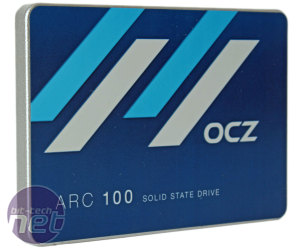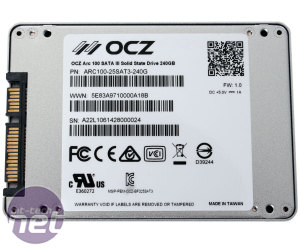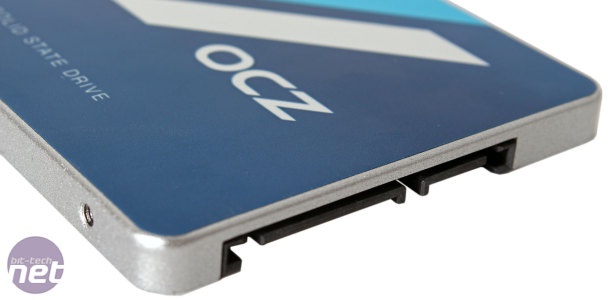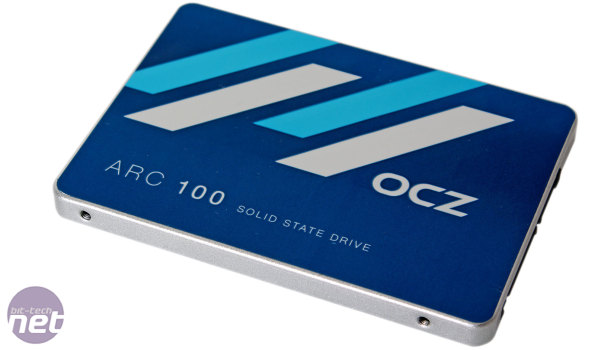OCZ Arc 100 240GB Review
August 13, 2014 | 15:17
Companies: #indilinx #ocz #ocz-storage-solutions #toshiba

Performance Analysis
As suspected, the Arc 100's sequential performance is low by today's standards. 461MB/sec read in AS SSD and 429MB/sec write in CrystalDiskMark are its best results, but these are still the worst and second worst in the charts respectively. That said, it should be remembered that the SSD 840 EVO utilises a TurboWrite buffer to achieve the high speeds seen – if a write command exceeds this then speeds will drop to much lower than those of the OCZ Arc 100 until the buffer can be flushed. Also, the MX100 results are for the 512GB version, as this is the only one we were given to test; the 256GB edition is only rated for 330MB/sec sequential write speeds, so would certainly be slower than this SSD.As for random performance, the single queue depth tests follow the same pattern as the other OCZ drives that use the Barefoot 3 controller. As such, the Arc 100 places near the bottom in AS SSD and CDM for random reads, but very much near the top for random writes. Meanwhile, at high queue depths, reads are again relatively low, with 309MB/sec and 324MB/sec trailing behind the best drives that can reach close to or even above 400MB/sec. Write performance is better again, and the Arc 100 places mid-league, but the differences here are much smaller, as the OCZ drive is just 15MB/sec behind the top performing drive in both AS SSD and CDM.
Real world performance in PCMark 7 is pretty poor too. This is a shame, as it's precisely things like starting applications and gaming workloads where most entry-level users are likely to want their SSD to perform well. In these two workloads, the Arc 100 is second from last and last respectively, and the SSD 840 EVO and Crucial MX100 are comfortably ahead. Thankfully, the Windows 7 start up time as recorded by BootRacer is one of the best.
Next we come to our mixed workloads, which are synthetic but deisgned to emulate certain professional workloads with varying ratios of read and write commands hitting the drive at once. Here, the Barefoot 3 controller really shines, coming fourth in all but one workload, the web server one, which is actually entirely read based anyway. Only drives which are considerably more expensive than the Arc 100 do better. The MX100 isn't far behind (and again it's the 512GB one, not the slower 256GB) but the SSD 840 EVO struggles here and is left in the Arc 100's dust. These tests operate at a high queue depth and with a relentless battery of I/O requests, so it's unrealistic to assume that your average home user, gamer or even enthusiast will see or feel differences as clear as the ones here, but even so you're a lot less likely to experience storage-related slowdowns with heavy multi-tasking than you are with other entry-level SSDs.
Finally, we have the results of our new consistency test, which is where the steady state performance that OCZ specifies comes into play. With both the Arc 100 and MX100, average IOPS quickly decrease and average response times quickly increase as the constant write commands fill up the drive and decrease the available space. This slows things down as the drives soon have much fewer blocks to select from for writing, and are thus constantly having to perform garbage collection by finding and erasing blocks with invalid data to prepare them for writing again, which takes a lot longer than simply writing to a readily available free block.
Clearly, the Arc 100 is much more successful here, quickly reaching a steady state whereby it never dips below an average of 19,000 IOPS and never has an average response time above 14ms. The MX100, meanwhile, continues to worsen, and by the end of the test is averaging less than 6,000 IOPS and average response times of more than 40ms. It's clear that the Barefoto 3 controller is great in this regard, but again the implication for client users (e.g. notebooks and desktops) isn't going to be that major, but again heavy multi-taskers should notice more consistent performance and fewer slowdowns and hiccups.
Conclusion
From the results, it's clear why OCZ is focussing on and heavily promoting performance in mixed workloads and sustained performance/consistency, as the Barefoot 3 controller certainly impresses here. Its peak performance and especially the speeds in the PCMark 7 trace-based tests do leave more than a little to be desired, however.Ultimately, it comes down to what sort of user you are. If you're the sort that likes to have multiple programs actively running at once, then the Arc 100 is a solid choice. It's also worth looking at if you're often likely to be transferring very large files to your SSD – the sequential write performance may appear low, but that of the 256GB MX100 is decidedly lower, and the SSD 840 EVO will be slower still should you exceed its buffer with a single command, so the experience will be a lot less consistent. However, if you only ever run a few programs at a time, aren't writing multiple gigabytes at once and just want your applications and games to feel snappy then the Samsung and Crucial drives are better choices, as their fast peak performance, especially with read speeds, makes them more suited to such a scenario, and both have significantly better feature sets as well.

-
Performance42 / 50
-
Features8 / 15
-
Value31 / 35


MSI MPG Velox 100R Chassis Review
October 14 2021 | 15:04












Want to comment? Please log in.